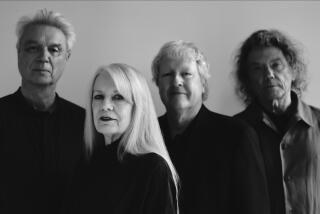Altamont: The Day the Music Stopped
- Share via
LIVERMORE — Altamont had its 20th anniversary last week. If you don’t remember what happened out here on that cold night in 1969, let me help. This is the place where California was supposed to have its own version of Woodstock. And what a version it was.
Altamont itself is not easy to find these days. You drive past the Oakland hills, then past Livermore and finally take a dirt road to an anonymous cow pasture. And there it is. The very spot where, as they say, the ‘60s died.
Of course, there’s a lot of places where the ‘60s supposedly died. You could make claims for Kent State, maybe. Or the motel in L.A. where Janis Joplin mixed heroin and Southern Comfort for the last time. But Altamont is as good as any.
A man named Larry Lacey owns the property now. There’s an old speedway next to the cow pasture and Lacey is trying to convert it to a motocross track. But the county is giving him fits, he can’t get the permits, and Lacey blames the history of the place.
Altamont is haunted, he says. The local folks have not forgotten the image of the Hells Angels wading into the crowd of kids, swinging those pool cues. And they don’t want any more public events out here. Not now, or ever.
And especially, Lacey says, they don’t want anything that has to do with motorcycles. You say motorcycle to the locals and they think Hells Angels and show up before the county board and say no way is this guy gonna run motocross at Altamont.
Lacey shrugs. He’ll try again in a few months. Maybe, someday, he says, they will forget.
Of all the major events of the ‘60s, Altamont surely is one of the strangest. The notion of a concert at Altamont originated with an offer by the Rolling Stones to play free at a site near San Francisco. Very quickly it grew into something much larger, nothing less than a re-creation of what was known as “Woodstock Nation.”
That meant an all-day, all-night festival, a gathering of the tribes without any external rules. At Woodstock, hundreds of thousands of flower children had indulged themselves in a weekend of drugs and rock ‘n’ roll without disorder. This was seen as proof that America’s young generation had grown up peaceful and no longer needed antiquarian law enforcement.
Based on the experience of Woodstock, the plan for Altamont was simple. The bands would show up, the kids would show up, and everything would turn out fine. Optimism was so high that a documentary film team of David and Albert Maysles was hired to record this carrying forward of the Aquarian Age in California.
What the Maysles brothers actually captured in their film, “Gimme Shelter,” was very different. The tribes gathered at Altamont all right, hundreds of thousands of kids with their bedrolls and blankets and tinkling bells. They came from all over and created a traffic jam 20 miles long. But before the music ever began, this crowd revealed that the Aquarian Age had gone on a bad trip.
They arrived with eyes glassy from drugs or falling-down drunk. In the film you see some of them wallowing on the ground, screaming, while their brothers and sisters watch them as if they are crippled bugs.
And when the music begins, so does the fighting. Inexplicably, incredibly, a band of Hells Angels has shown up to guard the stage. Their main weapons are pool cues and, when the tide of humanity surges toward the stage, the Angels go to work. One huge, fat man, completely naked, waddles toward the stage and is cut down by a swift blow to the head. He falls into the crowd and is not seen again.
Soon there is blood all around the stage and the concert has descended into chaos. Mick Jagger stops the band in an attempt to quiet the crowd and asks, “What war are we fighting?” No one seems to know, and minutes later a man is stabbed to death by an Angel directly in front of the stage. The Stones are then shown choppering out of the site, squeezed into the craft like the last Americans leaving Saigon, and Altamont is officially done.
That history is probably why you haven’t seen many of those fond recollections of Altamont on its 20th anniversary. This place does not fit--now, at least--with the way we like to remember the ‘60s. Altamont turned ugly and violent and it did that without any help from the authorities. The Age of Aquarius was pretty much put to rest by the Aquarians themselves.
And for just those reasons Altamont probably should not be forgotten. It has its own tale, and its own lessons.
More to Read
Sign up for Essential California
The most important California stories and recommendations in your inbox every morning.
You may occasionally receive promotional content from the Los Angeles Times.










